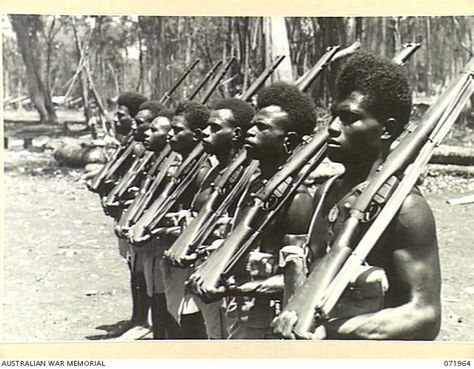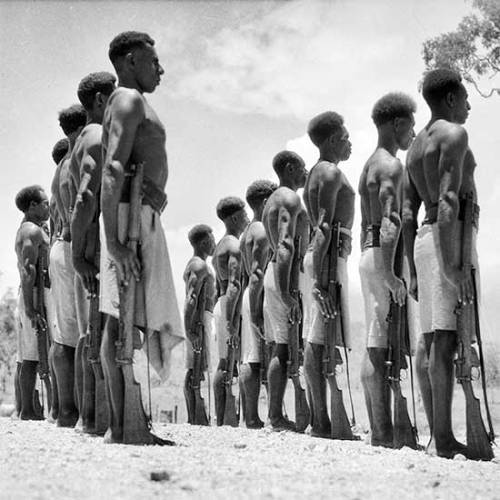scrapironflotilla:peashooter85:The Papuan Infantry Battalion, Papua New Guinea, World War II.“Soft l
scrapironflotilla:peashooter85:The Papuan Infantry Battalion, Papua New Guinea, World War II.“Soft lands breed soft men; wondrous fruits of the earth and valiant warriors grow not from the same soil.”—Cyrus the GreatIn the early years of World War II as the Japanese Empire expanded across the Pacific there was fear that the Japanese would choose Australia as it’s next target. Leading a force of Australian and American soldiers, Gen. Douglas MacArthur was determined to stop the Japanese at New Guinea. A recently organized part of the Australian Army in New Guinea was the Papuan Infantry Battalion (PIB), which was more like a small regiment consisting of 4 battalions. Led by 77 Australian officers and NCO’s, the PIB consisted of 550 men recruited from tribal natives of New Guinea. Known for being fierce fighters, the native men of the PIB made excellent light infantry, adept at reconnaissance, patrol, skirmishing, ambushes, and operating behind enemy lines. Being tribal natives who where born and raised in the rugged and unforgiving New Guinea jungle, these were hard men who were well adapted to their environment. The challenges and terrors of the jungle such as heat, disease, insects, parasites, and starvation which plagued Allied and Japanese solders was everyday mundane living for PIB recruits. As a result, the men of the PIB had several amazing abilities. They could travel hundreds of miles in a matter of days through thick jungles, swamps, and highlands with little trouble. They could also operate deep behind enemy lines, using their knowledge of edible flora and fauna and knowledge of medicinal plants to live off the land and operate independently of military supply. One interesting aspect of the PIB was their uniform, or lack thereof. The typical PIB soldier chose not wear clothes aside from a simple loincloth, and necessary military packs and webbing for ammunition and equipment. They didn’t even wear boots. They didn’t need them. Clothes just make you hot and cause jungle rot. Boots just slow you down. The Persian king Cyrus the Great once stated, “soft lands breed soft men.” Papua New Guinea is not a land for soft men, and the soldiers of the PIB were as tough as they come.When the Japanese invaded New Guinea in January of 1942, the PIB were the first Allied forces to make contact with the enemy by reconnoitering their positions and slowing the enemy advance by conducting a series of ambushes surprise attacks, and delaying actions. Throughout the war, PIB battle honors included the Kokoda Trail campaign, Salamaua-Lae campaign, Ramu Valley-Finisterre Range campaign, Bougainville campaign, and Aitape-Wewak campaign. Personnel from the PIB received the following decorations: one Distinguished Service Order, three Military Crosses, one George Medal, three Distinguished Conduct Medals, 15 Military Medals and three Mentions in Despatches. The PIB suffered 74 dead, 25 wounded, and 15 missing.https://www.kokodatreks.com/history/newguineaforces/papuaninfantrybattalion.cfmhttps://www.awm.gov.au/collection/U56156Along with the men fighting in the infantry hundreds of Papuans assisted the Australians by acting as carriers and stretcher bearers. Dubbed Fuzzy Wuzzy Angels on account of their curly hair (a term first used by British soldiers in Sudan) and tender and compassionate care for wounded soldiers. One soldier who fought at Kokoda later commented:They carried stretchers over seemingly impassable barriers, with the patient reasonably comfortable. The care they give to the patient is magnificent. If night finds the stretcher still on the track, they will find a level spot and build a shelter over the patient. They will make him as comfortable as possible fetch him water and feed him if food is available, regardless of their own needs. They sleep four each side of the stretcher and if the patient moves or requires any attention during the night, this is given instantly. These were the deeds of the “Fuzzy Wuzzy Angels” – for us! There is no known account of a wounded soldier ever being left behind by the Papuans during any of the fighting on New Guinea.The Australian government only recognised the contributions of these tremendous men and women in 2009, with many Kokoda veterans calling it too little too late.Sadly the last Fuzzy Wuzzy Angel, Faole Bokoi, died in March last year. As much as the soldiers who fought they deserve to be commemorated. -- source link



